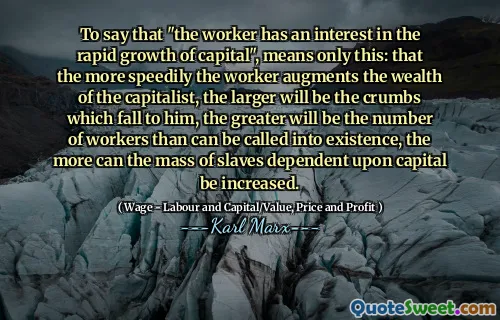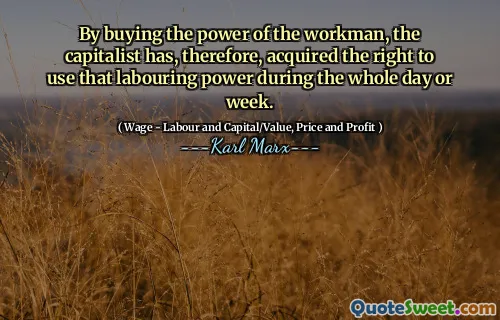
By buying the power of the workman, the capitalist has, therefore, acquired the right to use that labouring power during the whole day or week.
This quote from Marx underscores the fundamental dynamics of capitalism, particularly how ownership of labor translates into control over the worker’s time and effort. When a capitalist purchases the labor power of a worker, they are not merely buying a product or a service, but rather the potential to extract labor over a specified period—be it a day, week, or longer. This arrangement reveals the exploitative nature of the capitalist-labor relationship, where the value of the worker’s labor surpasses their wages, enabling accumulation of profit.
The concept highlights that labor is commodified—turned into a tradable, purchasable resource—“labor power.” Once purchased, the capitalist exerts dominion over the worker’s working hours, effectively controlling their ability to work during that time. This creates a power imbalance because the worker’s well-being, leisure, and personal time are subordinated to the capital’s pursuit of profit.
Analyzing this idea through a broader lens, it challenges notions of fair exchange, illustrating that the value derived by the capitalist is rooted in the surplus labor extracted beyond what is necessary for the worker's sustenance. This surplus labor generates surplus value, which is the core of profit in capitalist economies. Marx’s insight invites critical reflection on the justice and sustainability of such economic arrangements, as it emphasizes the inherent extraction of value from labor that is often invisible to the worker.
Moreover, recognizing this dependency highlights the importance of labor rights, fair wages, and working conditions. It also sparks ongoing debates about work hours, workers’ autonomy, and the morality of wage labor systems that tend to foster inequality and class divisions. Ultimately, this quote exemplifies the foundational critique of capitalism—its reliance on the commodification of labor and the resulting social implications.



